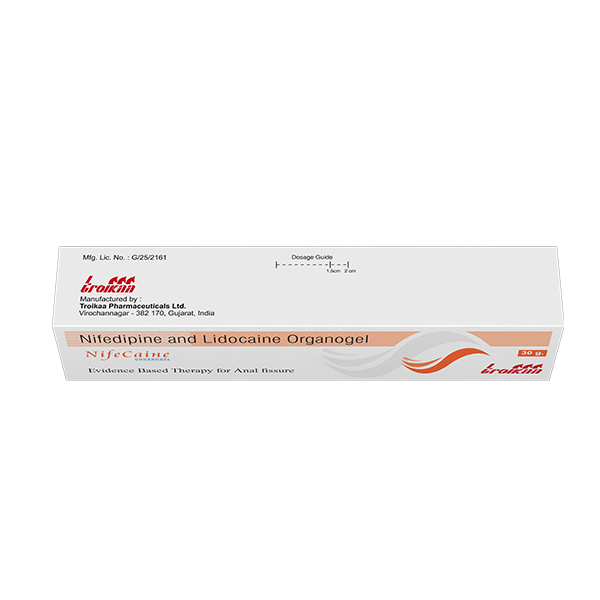NIFECAINE ORGANO Gel 30gm
$12.00 $9.00
NIFECAINE ORGANO Gel 30gm

Description
Nifecaine Cream is a combination of two medicines used in the treatment of anal fissures (tear in the lining of the anus). It relieves the pain, swelling, itching, and discomfort associated with the passing of stools in people who suffer from problems in the anal area.
Nifecaine Cream relaxes the blood vessels in the anus thus helping in the healing of anal fissures. It should be used in the dose and duration as directed by your doctor. Do not stop using it suddenly without talking to your doctor, as it may lead to worsening of your condition.
Before applying this medicine clean and dry the affected area. Make sure to wash your hands thoroughly before and after applying this medicine. Avoid getting this medicine into your eyes, nose, or mouth. If accidental exposure occurs, wash your eyes with water and seek immediate medical attention.
This medicine is generally well tolerated with minimal or no side effects. However, slight anal irritation may occur as a side effect of this medicine. This is temporary and usually resolves on its own in some time. Please consult your doctor if it does not resolve or persists for a longer duration. Inform your doctor immediately if you notice worsening of the infection or if you develop increased redness and irritation.
USES OF NIFECAINE RECTAL CREAM
- Treatment of Anal Fissure
BENEFITS OF NIFECAINE RECTAL CREAM
In Treatment of Anal fissure
SIDE EFFECTS OF NIFECAINE RECTAL CREAM
Common side effects of Nifecaine
- Anal irritation
HOW TO USE NIFECAINE RECTAL CREAM
HOW NIFECAINE RECTAL CREAM WORKS
SAFETY ADVICE

Alcohol

Pregnancy

Breast feeding

Driving

Kidney

Liver
WHAT IF YOU FORGET TO TAKE NIFECAINE RECTAL CREAM?
If you miss a dose of Nifecaine Cream, use it as soon as possible. However, if it is almost time for your next dose, skip the missed dose and go back to your regular schedule. Do not double the dose.
FAQ’s ABOUT NIFECAINE ORGANO Gel 30GM
Q. Does Nifecaine Cream cure anal fissures?
A: No, it does not cure fissures but Nifecaine Cream reduces inflammation of mucous membrane and skin. It reduces irritation, alleviates pain and itching, thus providing symptomatic relief.
Q. Why is my fissure not healing?
A: Fissures usually heal within a few weeks. But if they are not, this is because the oxygen supply, carried by the blood, to these fissures is poor which further slows down the healing process. As a result, these fissures fail to heal and continue to get worse. You should consult a doctor immediately if you have been facing issues for a duration longer than a few weeks.
Be the first to review “NIFECAINE ORGANO Gel 30gm” Cancel reply
Related products
Haemorrhoid
Haemorrhoid
Haemorrhoid
Haemorrhoid
Haemorrhoid
Haemorrhoid
Haemorrhoid
Haemorrhoid












Reviews
There are no reviews yet.